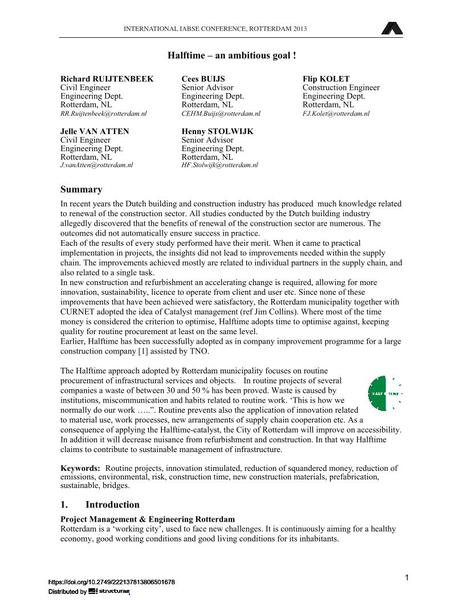Halftime – an ambitious goal !

|
|
|||||||||||
Bibliographic Details
| Author(s): |
Richard Ruijtenbeek
Cees Buijs Flip Kolet Jelle van Atten Henny Stolwijk |
||||
|---|---|---|---|---|---|
| Medium: | conference paper | ||||
| Language(s): | English | ||||
| Conference: | IABSE Conference: Assessment, Upgrading and Refurbishment of Infrastructures, Rotterdam, The Netherlands, 6-8 May 2013 | ||||
| Published in: | IABSE Conference, Rotterdam, May 2013 | ||||
|
|||||
| Page(s): | 372-373 | ||||
| Total no. of pages: | 8 | ||||
| Year: | 2013 | ||||
| DOI: | 10.2749/222137813806501678 | ||||
| Abstract: |
In recent years the Dutch building and construction industry has produced much knowledge related to renewal of the construction sector. All studies conducted by the Dutch building industry allegedly discovered that the benefits of renewal of the construction sector are numerous. The outcomes did not automatically ensure success in practice. Each of the results of every study performed have their merit. When it came to practical implementation in projects, the insights did not lead to improvements needed within the supply chain. The improvements achieved mostly are related to individual partners in the supply chain, and also related to a single task. In new construction and refurbishment an accelerating change is required, allowing for more innovation, sustainability, licence to operate from client and user etc. Since none of these improvements that have been achieved were satisfactory, the Rotterdam municipality together with CURNET adopted the idea of Catalyst management (ref Jim Collins). Where most of the time money is considered the criterion to optimise, Halftime adopts time to optimise against, keeping quality for routine procurement at least on the same level. Earlier, Halftime has been successfully adopted as in company improvement programme for a large construction company [1] assisted by TNO. The Halftime approach adopted by Rotterdam municipality focuses on routine procurement of infrastructural services and objects. In routine projects of several companies a waste of between 30 and 50 % has been proved. Waste is caused by institutions, miscommunication and habits related to routine work. ‘This is how we normally do our work …..”. Routine prevents also the application of innovation related to material use, work processes, new arrangements of supply chain cooperation etc. As a consequence of applying the Halftime-catalyst, the City of Rotterdam will improve on accessibility. In addition it will decrease nuisance from refurbishment and construction. In that way Halftime claims to contribute to sustainable management of infrastructure. |
||||
| Keywords: |
bridges risk construction time prefabrication environmental sustainable Routine projects innovation stimulated reduction of squandered money reduction of emissions new construction materials
|
||||
